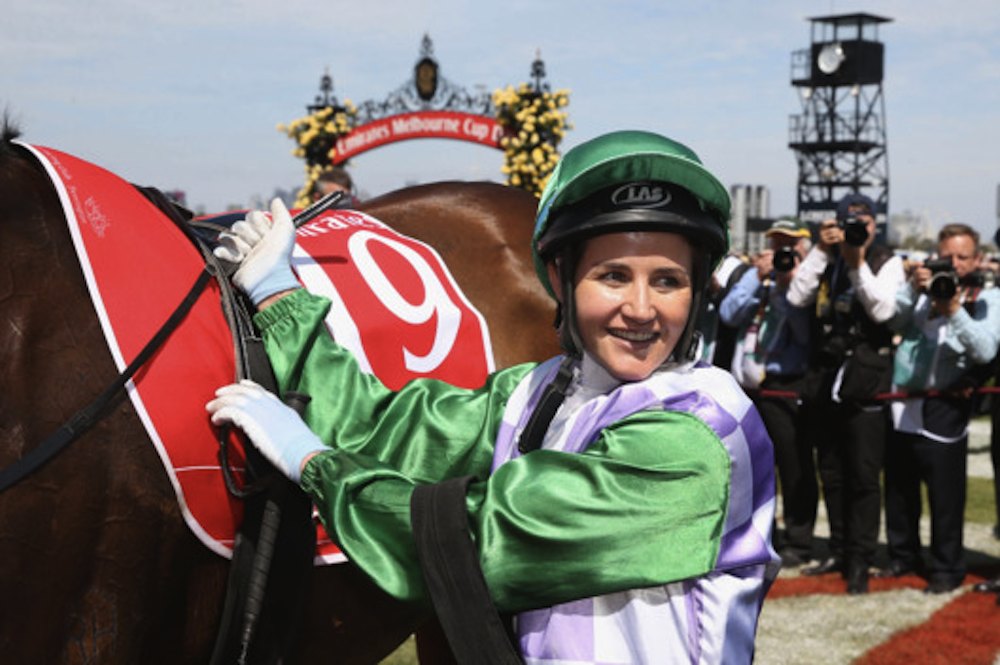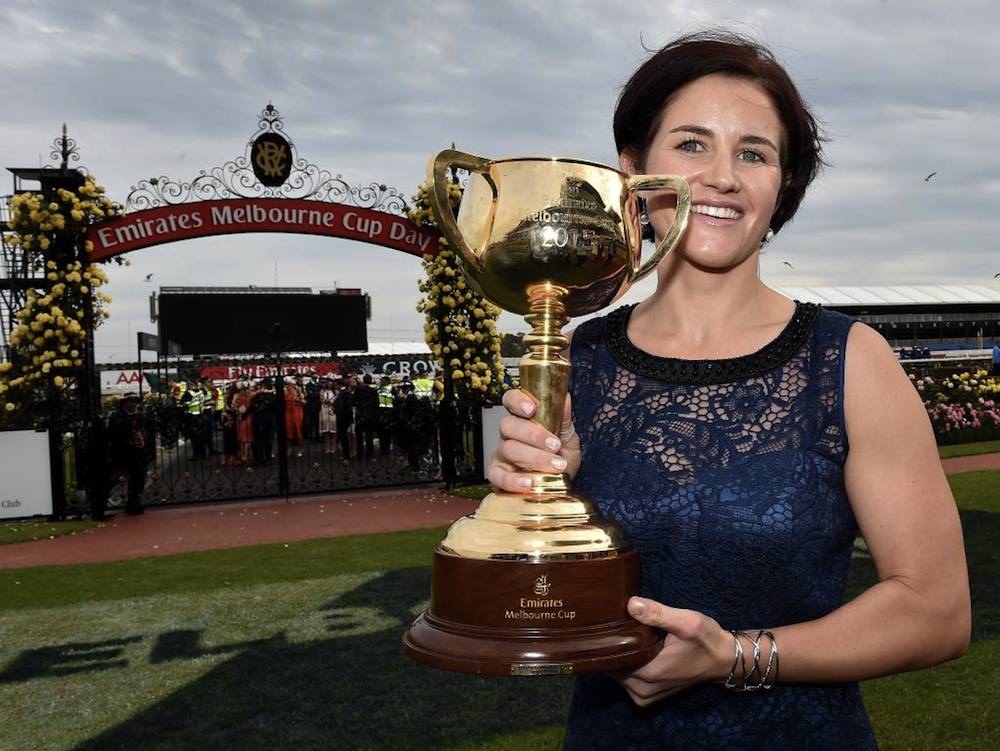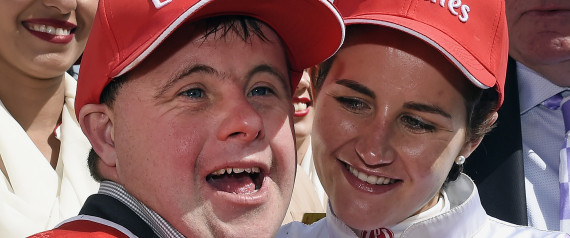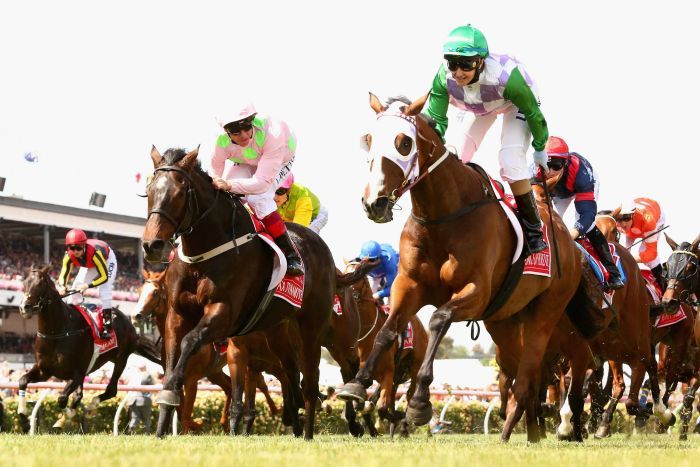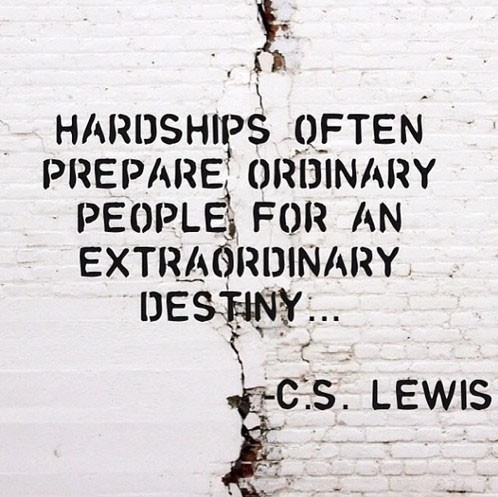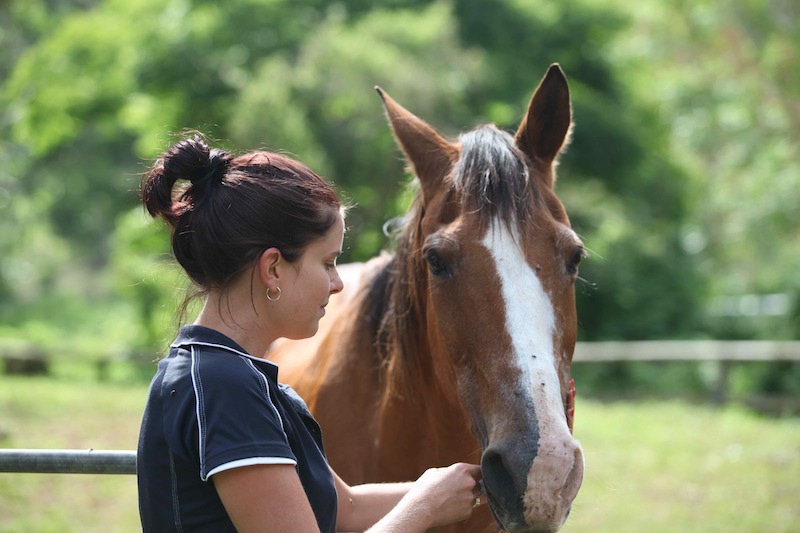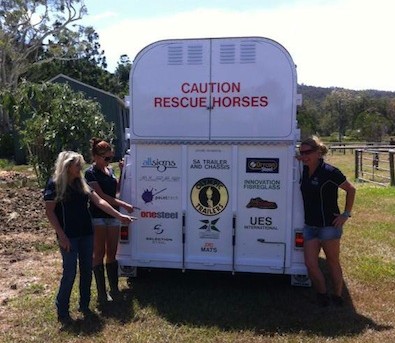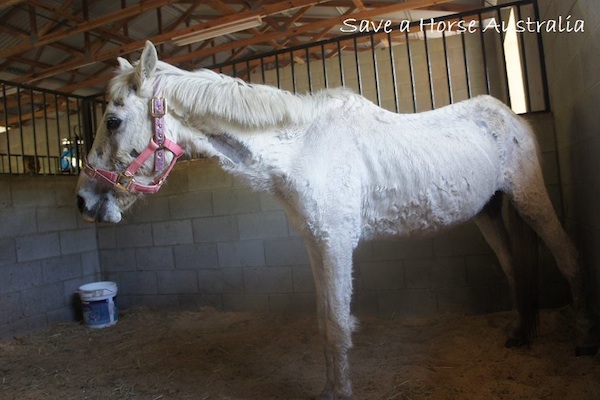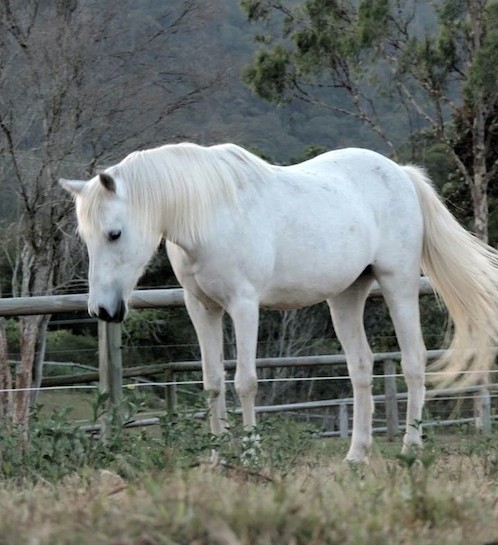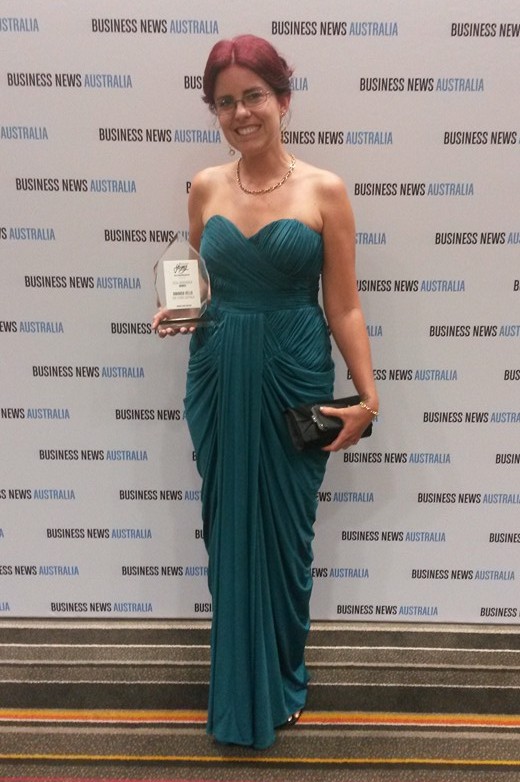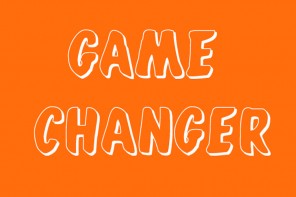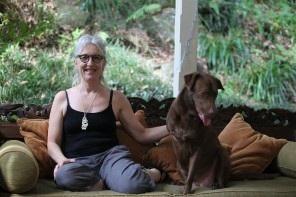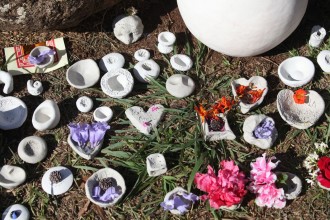Something extraordinary happened last Tuesday during the Melbourne Cup when a light bay racehorse horse with a long white blaze suddenly and magnificently surged through the pack, urged on to victory by his jockey, Michelle Payne. In that second, Payne became the first woman to win the Cup in its 155-year-history, and only the fourth woman to ride in the Cup – with one of those rides being by Payne herself, writes Candida Baker…
“I want to say to everyone else, get stuffed, because women can do anything, and we can beat the world.” – Michelle Payne.
Now, I have been around horses all my life, owned them a lot of my life, and ridden most of my life, and Payne’s win puts me on what you might call the ‘hooves of a dilemma’, which I shall explain by saying that as someone who has rescued and rehabilitated numerous horses over the years, including six of what are known as OTT TB’s (Off The Track Thoroughbreds), I’m not what you could call an obvious fan of racing. I’ve seen what racing does to horses, and how many of them are spat out at the end of their careers, sent for dog-meat, or broken down by the age of four or five because they’ve been raced too young. Not, I might add, that this is always the case, and I have also seen, close-up, the amazing care, love and attention with which many racehorse stables treat their charges. But for now I am going to put this dilemma aside, and write about Payne (and also about someone else as well – a woman who has arguably saved more horses from the ‘doggers’ than any other single person in Australia).
Two-and-a-half years ago, I began conversations with the then 28-year-old Payne, for a story I was writing on female jockeys for the Good Weekend – and let’s say for the record in answer to the note of slight surprise in some of the commentary on Payne’s win (where did she suddenly come from?), Payne was already by then a trailblazer. She was the first female jockey to win the Group One 1400-metre Inglis Sires’ Produce Stakes at Randwick in April 2010 and the prestigious Thousand Guineas at Caulfield in October 2010. In fact the determination in Payne could be traced back to her win on her father’s horse on her very first ride as a jockey.
In the media frenzy that ensued after her win, the extraordinary tragedies and challenges that were mostly only known to those in the industry have come to light.
Payne belongs to a well-known racing family from Ballarat, Victoria. Her father, Paddy, is a trainer. One of 11 siblings – who will ever forget the hugs she shared with her Downs Syndrome strapper brother Stevie after her win – she was only six months old when her mother, Mary, died in a car accident.
“My mother was driving the older kids to school when another driver pulled out of a side street and hit her door, killing her instantly,” Payne told me. The force of the impact flipped the car, but her siblings were unharmed. After the tragedy she was raised by her older, 15-year-old sister Brigitte, but suffered another devastating loss when Brigitte, who was riding barriers practice one day, had her horse fall on her. Eight months later, in 2007, she also died, as a result of a brain aneurysm.
In 2004, while she was still an apprentice, she fell heavily during a Sandown race, fracturing her skull and bruising her brain. Paddy, not unnaturally, pleaded with her to retire, but Payne refused, telling him that riding was her life. Not long after she returned to racing, she fell and fractured her wrist and, in 2012, while riding at the small Victorian country course at Donald, a bad fall resulted in two fractured vertebrae and two cracked ribs. By 2013 she was riding again.
On the day I spent with her at the track Payne was riding the brave little 15hh mare, Yosei, that only Payne was ever able to ride to a win, in the 1400-metre Sky Racing Tattersall’s Tiara – a Group One race the pair of them had won in 2011. Unfortunately that day, a bad start, which was not uncharacteristic of Yosei, saw them finish 7th out of 16, and Payne’s disappointment was palpable.
In fact, it was in the disappointment that I began to see the true nature of the agony and ecstasy of a jockey’s life. For Payne, the life of an elite horsewoman consists of competing in anything from one to six races on a race day, four or five days a week. Losing is more commonplace than winning, injury is rife and rides dependent on a complex web of relationships with trainers, owners, the horse itself – and even the bureaucracy of racing. To top it all off, she is a woman in what, despite some incredible achievements by Australian female jockeys in general, is, to borrow a quote from James Brown ‘…a man’s, man’s, man’s world’.
Despite the chauvinism however, there are many men in the industry who can see that things are changing. Maurice Logue, the General Manager of training and jockey safety at Racing NSW, told me: “The belief has always been that being a jockey is about strength, when in fact, it’s all about technique.” There is absolutely no reason, in the long run, he said, why women shouldn’t make up a much more equitable proportion of jockey numbers.
There is even a general school of thought that with the amount of female apprentices now 50% of the apprentice intake, (in Victoria at least) and as women become more equally represented, their ability to ride with more intuition and less force, will see them make extraordinary inroads in this industry which has only been a level playing-field since 1977 when the professionalism of New Zealand jockey Linda Jones and Queensland’s Pam O’Neill forced Australian jockey-club officials to grant women the right to compete on an equal footing.
It has gradually come to me that one of the core elements of a woman’s success often has to be an ability to brush off detractors, to stay constant through an astounding amount of adversity.
For Payne it was literally the thought of getting back on the horse that saw her through her months of rehabilitation. “Particularly Yosei,” she told me. “She was one of my inspirations.” And of course, for the lows, there are the highs – before the biggest high of all, Payne cites her career highs as her first ride in the Cup on Allez Wonder in 2009, and running second to Black Caviar in the Robert Sangster Stakes at Morphetville. “It’s the only time when running second was as good as winning – it was a fantastic feeling,” Payne said.
Curiously enough there is another woman whose story in many ways mirrors Payne’s and yet, seems on the face of it, to be coming from a diametrically opposed position. Amanda Vella is the founder and CEO of the charity, Save a Horse Australia. SAHA’s mission statement is simple and to the point: ‘To provide as many neglected, unwanted, slaughter-bound horses with a second chance at life and love’. It’s a credo that has seen this charity start from the humble beginnings of Vella’s own personal commitment to save horses, to an organisation that has a workforce of over 35 volunteers, a stunning 141,000 Facebook likes, and a legion of fans worldwide, ready to step up to the mark whenever Vella has to turn to them for financial help for a horse she’s rescued. I’ve interviewed Vella twice now, and she too has a tumultuous history.
Vella grew up in the small country town of Narrandera in the Riverina district of southern New South Wales. She was born with a love for horses, borrowing a neighbour’s pony before she got her own at the age of 11, but she was a bit of a rebel, and was “kicked out of pony club”.
But the rebellious streak was not surprising. Vella lost her mother to cancer when she was seven, and her father, who didn’t cope well with her mother’s death, committed suicide when she was 13. Vella, caught in a maelstrom of loss and grief, turned to horses even more. At 14, she rescued her first horse, but soon after she’d made the decision to move to the Gold Coast, one of the few places she knew that had happy memories.
“I’d been taken there on a holiday by a family friend,” she told me. “When things got difficult with my family it was a question of going into care or leaving Nerrandera.”
Vella lived, as she calls it, “rough” on the Gold Coast until the local state school principal cottoned on that things were difficult, and helped her organise her life so that soon she was renting a caravan and working part-time at three different jobs – and she was still only 14. Over the years Vella has rescued, rehabilitated and rehomed thousands of horses. She has also witnessed the sad and often unnecessary deaths of hundreds of others, and has to make, on a daily basis, life and death decisions.
If Payne knows that she was born to ride, and as she has said, that she knew she would win the Melbourne Cup one day, then Vella believes that she was, as she puts it, “born on this earth to rescue horses”. Like Payne she’s had her detractors – it seems, she says, as if sometimes not only can she not please all of the people all of the time but she can’t even please any of the people any of the time. Take her FB post from Melbourne Cup day, (reprinted with her permission) which she says, is always a day of mixed emotions for her:
“Wow what a crazy day…Melbourne cup day is always fun that’s for sure…and I don’t mean ha ha fun…So I got abused by vegans for attending a vegan fundraiser for my own charity and for exploiting horses by holding a fundraising horse show…horse shows are inhumane so some say…Then I got abused by anti-racing people for not being vocal enough to ban racing; then I was abused by racing people for bagging the racing industry because I’m promoting an ex-racehorse rehabilitation program – then I was bagged for not sharing the post about the broken down racehorse, then I was abused for showing empathy towards the heart-broken jockey, then I was abused by an old school friend for being anti-racing when I attended pony club as a 12 year old (that makes me a hypocrite)…But I did raise a lot of money to rescue more and more ex-racehorses so all in all the results were good….However, my head is well and truly done in…”
In some ways Vella’s constant mystification at the amount of negative commentary she receives from what she calls “the haters”, I’m sure too is echoed in the amount of chauvinism that Payne has endured. Ultimately both of them are fuelled by passion. “I love it,” Payne says. “I don’t even see it as a job. I wanted to be a jockey from the age of four. It’s in my blood. I’m competitive and I love horses, so it’s a perfect mix for me.”
Somewhere at the heart of this piece – and perhaps Vella and I are somewhat in accord with this – is the duality that can allow me to admire Michelle Payne, but dislike many racing practises. Vella, who often makes the hard choice to rescue an old horse that she feels deserves to spend its last years happily on earth over rescuing a young racehorse, has created a specific racehorse rehabilitation scheme to run in tandem with SAHA, and most recently she’s moving towards using the SAHA horses as part of an Equine Assisted Psychotherapy program. In an echo of Payne’s success Vella won the young Queensland Entrepreneur of the Year Award only a few weeks ago, and earlier this year several of her volunteers picked up major awards for their dedication to saving lives.
Another common denominator for these two passionate advocates of horses is their connection to their mothers. Vella says: “I often feel my mother with me, and I know that I am looked after.”
Payne told me: “I feel my mum riding with me and if I ever feel worried or anxious, I can sense that Mum and Brigitte with me. To be honest, I’ve been lucky my falls haven’t been worse, and I think that’s because of Mum.”
If I share – apart from a love of horses – some small connection with these two amazingly courageous women, it’s that horses were my touchstone through a tumultuous and chaotic childhood with alcoholic parents. It would seem that there is something about a lifelong connection with horses that is almost beyond choice – once it’s in the blood, it’s there to stay.
I’ve learned over the years is that for me at least, life is not black and white; in fact in my life it’s not even shades of grey, perhaps it comes from living in the Rainbow Region, but to me life is multi-hued, complex and full of dualities. Embracing Payne’s extraordinary success, her courage, her place forever after in the pages of history doesn’t diminish my feeling that more should be done for ex-racehorses in this country.
Coincidentally I wrote my stories on Michelle Payne and Amanda Vella for two different publications but at around the same time. Since then I’ve followed both their careers. These days my life revolves more around hanging out with my horses than riding, and I’ve discovered an extraordinary ‘deep space’, into which a horse and I can drop, where a communication occurs that I couldn’t even begin to explain at the moment.
It would surprise Payne and Vella to know, I’m sure, though that in the early morning hours when I get up to write, while I’m waiting for the kettle to boil for my first cup of tea for the day, I look out of the kitchen window at our horses, and I often think of both these women – champions in their different ways, Payne out riding trackwork or getting ready for a day’s racing, Vella facing another day of the roller-coaster ride that is horse-rescue, and I admire both of them more than I can say.
To find out more about SAHA go to: saveahorse

